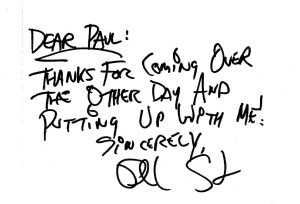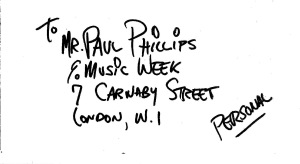Anytime I like, I can close my eyes and transport myself back to the summer of 1966.
The sun is shining and pop is becoming sublime.
Monday Monday, Summer In The City, Sunshine Superman, Paperback Writer, Good Vibrations, Revolver, Pet Sounds – it’s easily the best summer for pop music to date. Possibly ever.
It’s the summer of me, John O’Sullivan, Jenny Cropper and Jenny’s cousin.
John is moping about the cousin. Jenny is moping about John. I’m moping about Jenny.
The cousin isn’t bothered either way.
Talk about (I Can’t Get No) Satisfaction.
Still, aged 17, everything points to a future of magic, hope and optimism. The next few years were not to disappoint.
Talking about 1966 and classic songwriters, Michael Brown is not a name that would spring to many people’s minds. But he did write one stone cold classic. He was 16 when he wrote Walk Away Renee with two of his bandmates in The Left Banke. It made number 3 in the UK charts, number 14 in America.
It was a nice record, but not a great one.
Given where pop was by 1966, Left Banke were slightly behind the curve. The singing is rigid and uncertain and the production and arrangement are over-elaborate. They’re trying too hard. Phil Spector or George Martin would have sorted it, although they might have struggled with Michael Brown’s vocals.
But George and Phil didn’t get the gig. It fell to Motown’s top production team – Brian Holland and Lamont Dozier – to reveal the true greatness of the song when The Four Tops recorded Walk Away Renee for their phenomenal Reach Out album.
This was an album that included 7 Rooms of Gloom, If I Were A Carpenter, Standing In The Shadows Of Love and Bernadette. Any song would have its work cut out to shine in this company. But Walk Away Renee fearlessly followed the smash hit opener, Reach Out I’ll Be There, and did the job so brilliantly it became a pop standard.
At number 220 on Rolling Stone magazine’s 500 Greatest Songs Of All Time, it sits just above Walk On The Wild Side, Pretty Woman, Dance To The Music and Good Times.
So Michael Brown has his own little corner of pop eternity.
He died earlier this week. In keeping with the pop fraternity’s efforts not to live into old age and become a burden on society, he was only 65.
In the last month alone Lesley Gore (68), Andy Fraser, bass player with Free (62), Chris Rainbow (68) and Steve Strange (55) have all done their bit to reduce our burden.
I was saddest about Chris Rainbow. Back in the late 70s and early 80s, Chris and my music partner Pete Zorn did a lot of work together. They would frequently end up back at my sister’s in Gipsy Hill for mind altering substances and the best cheesecake on the planet.
Chris spent the last years of his life on the Isle Of Skye.
After I chose Denis Blackham to master my 2012 album, Now That’s What I Call Divorce!!!, it turned out Denis was also living on Skye. (Skye Mastering. Duh!). It stood to reason he would know Chris.
Sadly, he told me, Chris was suffering from dementia. He also had Parkinson’s Disease.
Remembering a young man who had scared the pants off me driving around London in his Rover 2000 (once was enough) and – despite a debilitating stammer – could have you laughing into the early hours of the morning, it seemed a terrible end.
No worse than for anyone else who suffered similarly, I’m sure. But Chris Rainbow was preternaturally talented, and it’s a cruel God who doesn’t allow full rein to such gifts.
Back to that summer of 1966. As it drew to a close, I was on my way to London in a black Humber Hawk estate (‘the hearse’ my mother called it). On the radio Satisfaction was still being played, and Monday Monday.
Listening to music cocooned in a big car was a much better way to experience it than on our Dansette player back home. Everything was enhanced. Most of all from that four hour journey I remember Lee Dorsey’s Working In The Coalmine.
Obsessed as I was with The Beatles, I was unaware that r’n’b and soul music had crept up on me. Hearing Lee Dorsey as if I was inside a hi fi speaker suddenly coalesced my taste for something different – the rougher, tougher descendants of the blues.
As the summer before the summer of love turned into the actual Summer Of Love, you would find me dancing myself dizzy at parties all over London to Arthur Conley’s Sweet Soul Music.
I didn’t need a dance partner. Didn’t want one. I was in what was then the greatest city in the world, at the best time it was possible to be there. I was 18, and I was a dancing fool. Otis Redding, Wilson Pickett, Sam & Dave, Joe Tex, Aretha Franklin, Carla Thomas, Booker T – oh my goodness, were there ever such riches? It’s a wonder Sgt Pepper got a look in.
And the fun didn’t really stop until round about the mid-70s, when the beginning of years of social unrest revealed the fine line that separates civilisation from our more primitive selves.
But even the three day week and the winter of discontent couldn’t take away those memories of 1966.
And, for me at least, there’ll never be another summer like the summer before the summer of love.
Hard to find decent video for Walk Away Renee from that time, but you should watch at least the first 30 seconds of this, if only to see how hard the stylists and the cameraman have worked to make Michael Brown look like Paul McCartney (15 seconds in).
And this will hopefully take you to Spotify for a pristine Four Tops.

